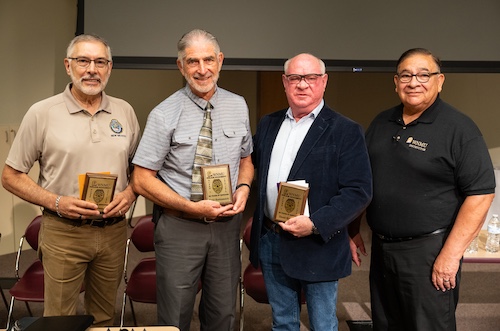 Members of the first graduating class of WNMU Law Enforcement Training Academy stand with Director Gil Najar at the academy's 50th anniversary celebration, Sept. 11, 2024. Pictured (L-R) are Karl Wiese, Fred Radosevich, David Schuetz, and Najar.SILVER CITY, NM—Western New Mexico University celebrated the fiftieth anniversary of its Law Enforcement Training Academy on September 11, 2024 at the Besse-Forward Global Resource Center.
Members of the first graduating class of WNMU Law Enforcement Training Academy stand with Director Gil Najar at the academy's 50th anniversary celebration, Sept. 11, 2024. Pictured (L-R) are Karl Wiese, Fred Radosevich, David Schuetz, and Najar.SILVER CITY, NM—Western New Mexico University celebrated the fiftieth anniversary of its Law Enforcement Training Academy on September 11, 2024 at the Besse-Forward Global Resource Center.
Those in attendance were welcomed by Director of the Law Enforcement Training Academy Gil Najar and Provost and Vice President of Academic Affairs Jack Crocker.
Crocker emphasized how the academy has not just contributed significantly to public safety in southwest New Mexico but to the state as a whole. "Many [graduates] have gone on to be leaders in law enforcement and are keeping our communities safe," he said. "We are continuing to serve the community and the state [by graduating] well trained officers who move into the community and serve in leadership positions as well as protect us."
The keynote speaker for the event was Fred Radosevich, a member of the first graduating class who served as chief of police for multiple New Mexico communities. Radosevich reminisced about his time at the academy and how regimented the students' days were. "Everywhere we went on this campus, we marched together. We ate breakfast together; we at dinner together."
Radosevich's former classmate, David Schuetz, who also spoke at the event, had similar recollections. In addition to the physical training and conditioning, he said, "we were taking 21 hours of college credits each semester … It was mentally and physically challenging to say the least." Schuetz credited that rigorous program at WNMU for preparing him and his colleagues for very successful careers.
Beyond the rigors of their time in the academy, Radosevich especially remembered then-academy director Steve Slater. "I think a lot of the things I learned in my law enforcement career came from this academy and from Steve Slater." Slater's approach to discipline was "militaristic," but the lessons he shared went far beyond discipline, said Radosevich. "He taught us to be compassionate with people. He said, 'You are dealing with people who are probably at the low point of their life, having some kind of crisis, and you are the one who is going to be able to help them out.'"
Like Schuetz and Radosevich, fellow 1975 graduate Karl Wiese spoke about what he learned at WNMU and how that informs his perspective on policing today.
"What is important is what they taught us fifty years ago, and that was the old 'protect and serve,'" said Wiese. "There are two obligations: number one, to protect people, and not only does that mean victims and other police officers but also included the defendants and the suspects we were dealing with."
Wiese added that the concept of service especially needs to be emphasized in law enforcement education. "I think that might be where law enforcement might have dropped the ball a little bit these days," he said "We need to—in our academies and through our supervision and our training in law enforcement—get the men and women who are in the profession now to focus back on that concept of quality service."
Quality service, said Wiese, means "When you approach a car in a traffic stop, you do not walk up yelling and using foul language and being disrespectful to someone; that is not quality service. It means when you go to a residence and handle a burglary call, you take the time to do a neighborhood canvas afterwards. … It means that if you are a detective and you get a report assigned to you, and you read through it, and you don't feel like there are any leads, you still take the time to call the victim and ask them if there is anything else, and you let them know that you are at least looking at their case."
Wiese, who is a retired police chief, undersheriff, municipal commander and consultant, said what WNMU taught him about protecting and serving was integral to the success of his career. "I really owe it to what I was taught here at Western New Mexico Police Academy," he said.










